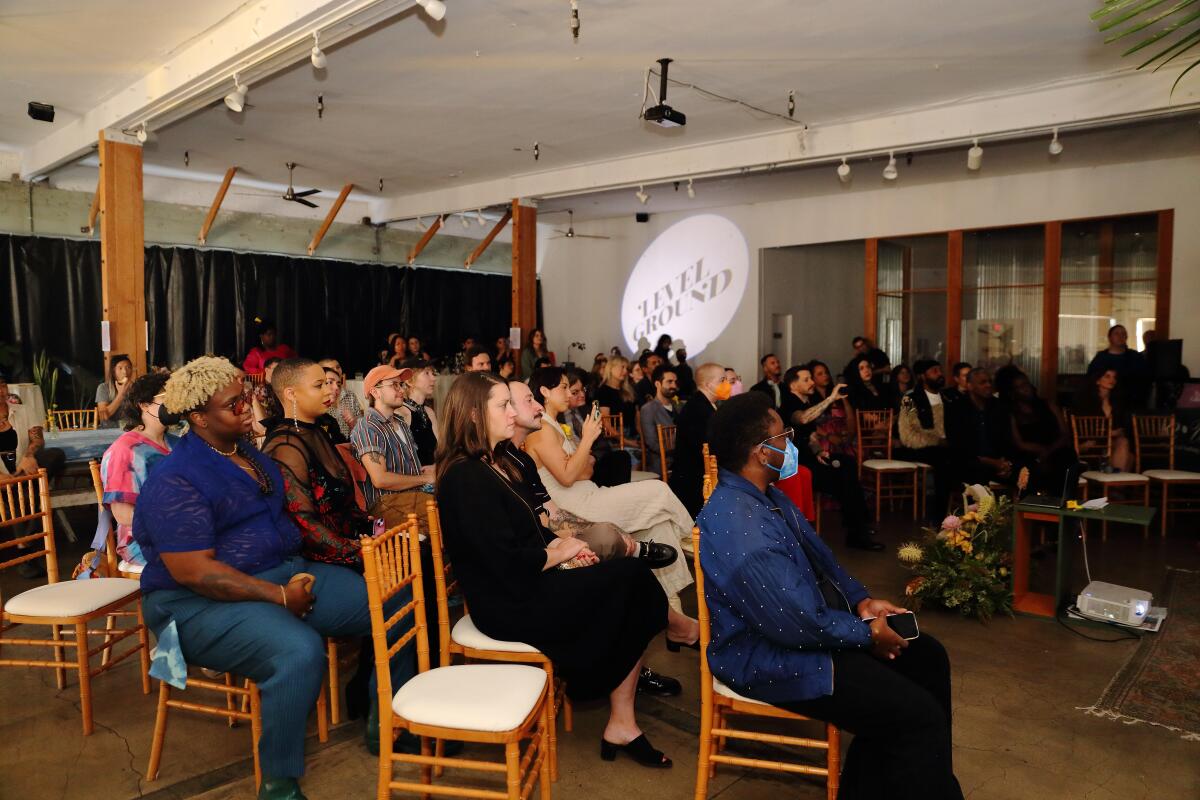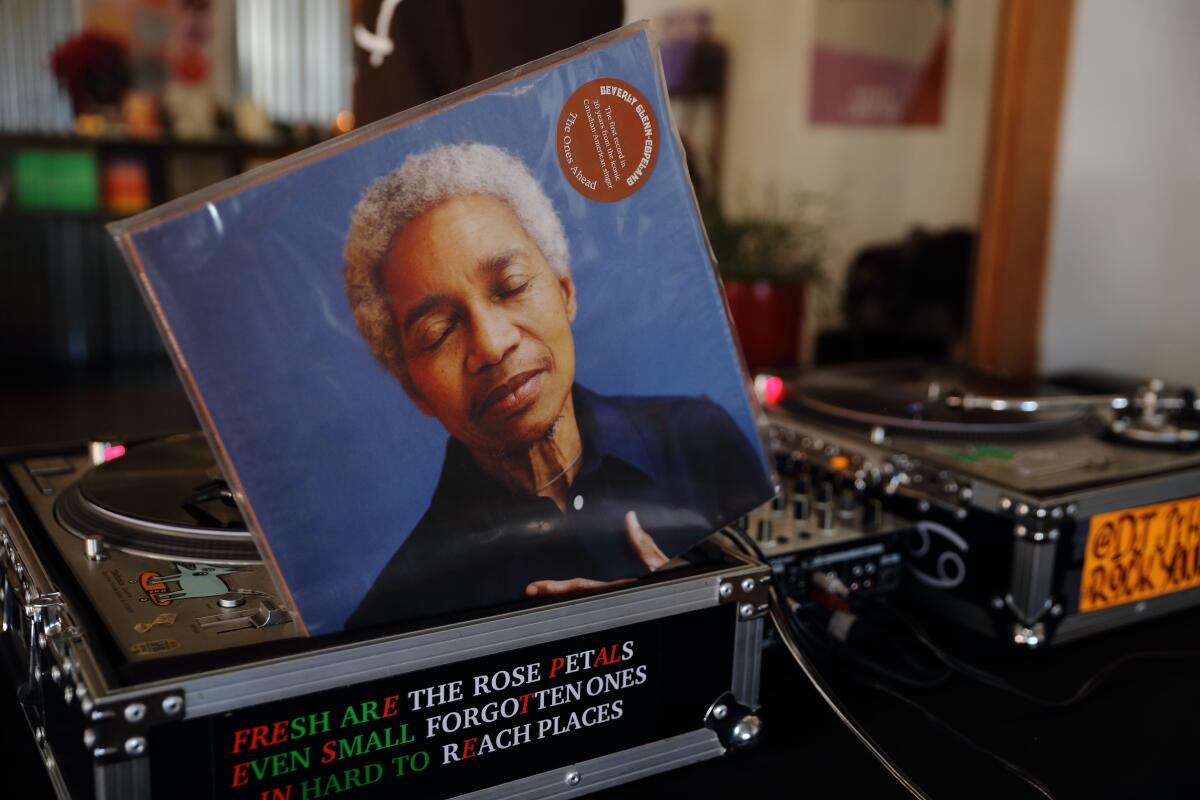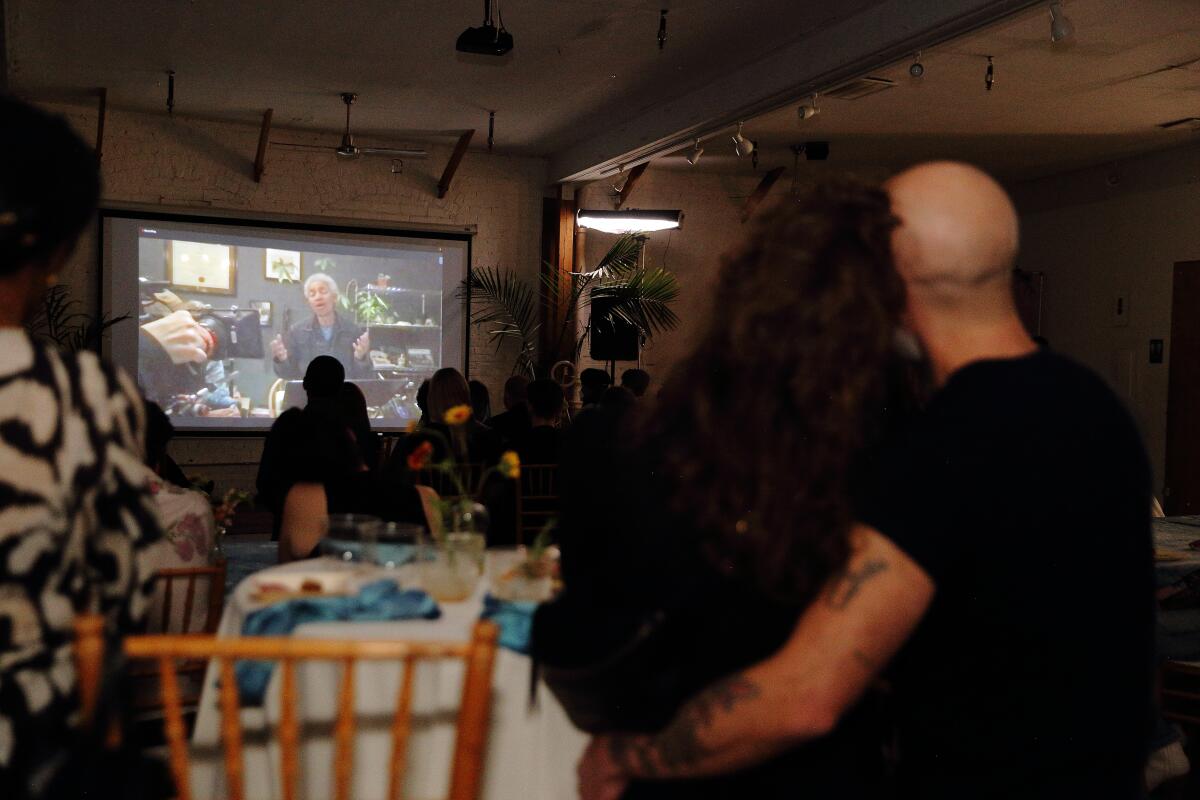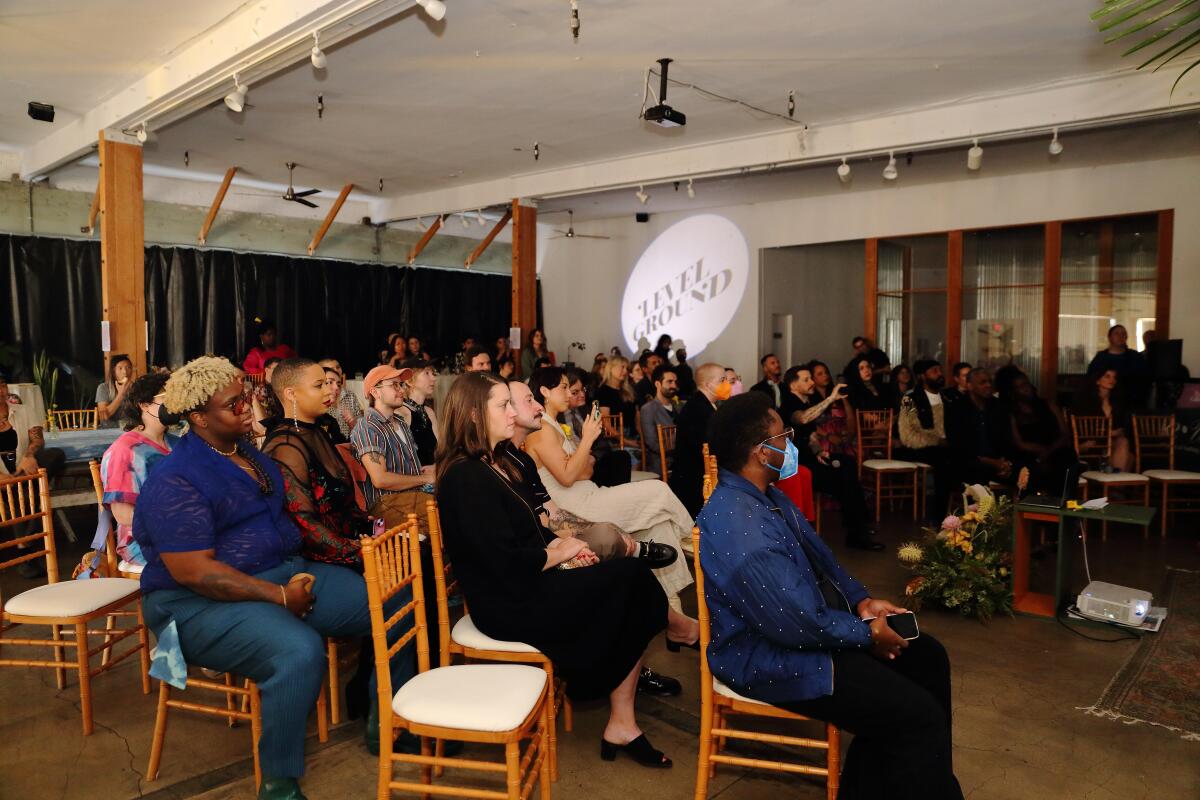“This took 30 years to write,” Beverly Glenn-Copeland says, laughing, remembering how his song “Prince Caspian’s Dream” came to him in small increments every 10 years starting in the 1990s.
A room of fans and artists wearing their red-carpet best in a downtown L.A. loft hung on Glenn (his preferred name) and his creative and life partner Elizabeth Glenn-Copeland’s every word and note Saturday afternoon. Zooming in from their home in Hamilton, Canada, they shared stories, songs and sacred objects: cherished photos, a Christmas mouse, even a sacred pickle. “This is my alter ego,” Glenn said, holding up a picture of a turtle, “it takes me a very long time to get to any place in my life.”
In 2015, Glenn’s self-released 1986 album “Keyboard Fantasies” received critical acclaim, global recognition and a new life when Ryota Masuko started importing tapes directly from him to collectors in Japan, which was the subject of a 2019 documentary. In the years since, Glenn’s status has gone from local artist to internationally respected genius; this year he’s collaborated with Sam Smith and Devendra Banhart, received a Lifetime Achievement Award for his queer activism, and an honorary doctorate from the University of Toronto. While Glenn is happy that his work has a wider reach today than it did in 1986, he was never waiting around for anyone to find him. A Black trans elder who has refused to sacrifice himself or his art for the sake of playing by the rules, he has cultivated a diverse fan base that finds inspiration and hope in his music and life story. Glenn has always been an active and inspired visionary who sees his music and art connected to a personal and spiritual path. And nothing, not even dementia, can ever change that.
The Glenn-Copelands, accompanied by pianist Alex Samaras, performed Saturday for Level Ground Co.’s Re-Union: 10 Year Anniversary Soirée. Level Ground Co. is an artist collective and production company focused on telling empathetic and experimental stories, supporting diverse creatives, particularly those who are queer, transgender and people of color. The organization hopes to create an “eco-system and community” of artists, co-director Yétúndé Olágbajú said. Level Ground Co, along with artist Josephine Shetty of Pride Month Barbie, worked together to make the soiree an intentional event that embodied this sentiment; indigo dying napkins, sourcing artist-created cakes, drinks and food, and booking DJ Jihaari to remix Glenn’s catalog with dance music.
The celebration doubled as a filming location for “See You Tomorrow,” a new documentary by Level Ground Collective co-founder and co-directors Samantha Curley and Chase Joynt, about the couple’s journey navigating Glenn’s dementia diagnosis. In the film they contemplate complex decisions about his care and well-being while they embark on a mission to preserve his artistic legacy. It also follows them as they work to leave creative offerings for their loved ones, and for the ones ahead.
After a career spanning seven decades, this was Glenn’s first-ever L.A. concert, and he received an incredibly warm welcome. Originally scheduled to be in-person, Level Ground Co. pivoted when the Glenn-Copelands learned that they could not travel to L.A. due to some recent health concerns. The event was an experimental afternoon of singing songs, sharing stories and poetry, and some never-before-seen personal and performance footage. People danced, cried, and sang along, sometimes sustaining Glenn and Elizabeth’s notes, keeping the physical and spiritual connection alive in L.A. in the few moments that digital tech difficulties cut it short.

The crowd at Level Ground Co.’s Re-Union: 10 Year Anniversary Soirée in downtown L.A. watch Beverly Glenn-Copeland and his wife Elizabeth perform via Zoom. The couple were originally scheduled to perform in person but had to switch to a virtual performance due to Glenn’s health concerns.
(Tina June Malek)
“What’s manifested through Glenn and Elizabeth performing virtually is an extraordinary opportunity for the film,” Joynt said, describing the twin film teams, one with Glenn and Elizabeth at their home in Hamilton and one in L.A. “From an audience perspective, you’re going to be able to see that these rooms are vibrating and breathing and living for and through each other. If I do my job right, we will obliterate the Zoom screen.” Curley thinks of this as one of the most hopeful projects she’s been a part of that feels urgent and gentle. “To be close to Glenn and Elizabeth, to be in their world of deep, queer, chosen family is such an honor and a privilege,” said Curley.
Glenn and his wife Elizabeth’s journey together started in the 1990s when she sang backup for Glenn at benefit shows. Their queer love story heated up in 2007, when, after psychic visions in the dream realm and a notorious night of furious dancing at a friend’s wedding, the pair became an inseparable team. Their love continues to unfold around collaborations, social justice advocacy, music and steadfast commitments for each other and their communities. Take for example their work at Kidplayhouse Productions; a not-for-profit theater school the couple founded and sustained for nearly a decade on the Acadian Coast of Canada that provided healing arts programming and education for kids and adults.
Earlier this year, Glenn and Elizabeth announced that the couple were privately navigating a difficult time while also experiencing a massive creative renewal. Glenn made his dementia diagnosis public and declared that his 2024 tour would be his last. However, he and Elizabeth are still working on new projects including music, children’s programming with puppets, and a new book. After the success of Saturday’s event they may be considering doing more hybrid performances.
“As humans and artists, there’s a lot to face, but we are determined to look at where the life is,” Elizabeth said. “As parts of Glenn’s brain are dying, there are parts of him that are actually more alive than I have ever seen. There’s a great deal of beauty interwoven with a great deal of pain.” In thinking about how they proceed in this chapter of their life, and how humanity can overcome the daunting challenges of rising fascism, racism, transphobia and climate disaster, she invokes a lesson from Los Angeles artist-activist (and nun) Corita Kent. Rule No. 4, which also happens to be Level Ground Co.’s current inspiration, demands that students and artists “consider everything an experiment.”

Shot of a vinyl copy of Beverly Glenn-Copeland’s 2023 album “The Ones Ahead” at the DJ booth during Saturday’s performance.
(Tina June Malek)
Glenn’s work has long reveled in the experimental. A groundbreaking album in folk, ambient and electronic music, “Keyboard Fantasies” was composed with only a Roland TR-707 drum machine, a Yamaha Dx7 keyboard, a (at the time) cutting-edge Atari Computer, and Glenn’s unparalleled three-octave vocal range. Optimism and care are themes you could gather from his music without knowing any of his lyrics; “Keyboard Fantasies’” soft and cosmic melodies resonate like a dawning horizon, a message in a bottle retrieved 30 years later by both its recipients and its sender with codes and keys to help us make sense of our ever-changing world. He and Elizabeth opened their set Saturday with the album’s “Let Us Dance,” moving together as Samaras played the instrumental outro on their home piano.
Glenn also performed an a capella version of “Deep River,” his syncopated low voice and skilled falsetto moving the entire room into snaps, whistles and screams. A spiritual written in the 19th century, it is embedded with coded information about the Underground Railroad, Glenn explained. “Jordan” was code for the Ohio River, and “Campground” was code for a community for Black people who were successful in escaping enslavement. He closed this song with a dynamic djembe beat, moving through multiple time signatures.
Glenn and Elizabeth played a string of sold-out shows during fall in New York and Canada that Joynt and Curley filmed. Glenn won the 2024 Joyce Warshow Lifetime Achievement Award from SAGE, an organization that focuses on advocacy and services for LGBTQ+ elders. He and Elizabeth were also a part of Red Hot Org’s new album “Transa,” a massive collection of work from a diverse community of over 100 musicians and artists including (but not limited to) Sade, Eileen Myles, Hunter Schafer, Clairo, Sam Smith and many others, celebrating trans and nonbinary music, and bringing awareness and support to transgender rights.
“In this era of intense backlash against trans rights and freedoms, it felt like a profound and timely gift to collaborate with Sam Smith on a version of ‘Ever New’ for the next generation,” Glenn said. The two formed an instant connection in the studio. “There’s great love there,” Elizabeth remarked, remembering that “as they were hugging, Copeland said, I’m adopting you.” Smith said that singing with Glenn was one of the most important and beautiful moments of their musical life. The backlash against trans rights is palpable this week, as Chase Strangio makes history as the first openly transgender attorney to argue before the Supreme Court, challenging Tennessee’s ban on transgender healthcare — which is expected to be upheld, despite the Biden administration calling it unconstitutional.
The new documentary challenges and complicates one-dimensional narratives about dementia. Working on this has helped both the filmmakers and the doc’s main subjects reimagine staying connected through music and art alongside some of the inevitable changes of aging. Saturday’s event also presented an opportunity to reimagine what supporting aging artists, as fans and as producers, could look like.
“See You Tomorrow” is an unfolding trans history, a living portrait of a queer extended family, rather than a reflection on something that’s happened in the past. It bears “witness to an extraordinary love story as it is still unfolding,” Joynt says.

A crowd watches Beverly Glenn-Copeland and his wife, Elizabeth, perform virtually from their home in Hamilton, Canada
(Tina June Malek)
Queer and trans musicians are often described in relation to time: generally, as being ahead of their time, playing in strange time, or living creative lives outside of values and timelines marked as acceptable by rules of mainstream society. The ahead-of-their-time arc has often plagued stories about so-called forgotten and avant-garde queer talent from electronic to classical genres. It is often queer artists and artists of color like Glenn who inspire culture, change genres and creative fields, rarely benefiting financially from their visions and innovations, but still creating.
As the couple received a roaring ovation at the end of their set on Saturday, Glenn held up a handwritten sign to the camera. The message, scrawled on a white sheet of paper, read “I love you.” For many fans, Glenn represents beloved elders of the queer community and his music is also a love letter to younger generations.
“Glenn’s life and legacy is so precious because we have so few trans elders,” Elizabeth says, noting the historic importance of sharing her husband’s story. “We want to leave this world in a way where we have touched lives, shaken people out of stupors, and woken people up. … In all the years, when nobody knew who the heck we were, we were traveling around from place to place; it’s always been about community.”
